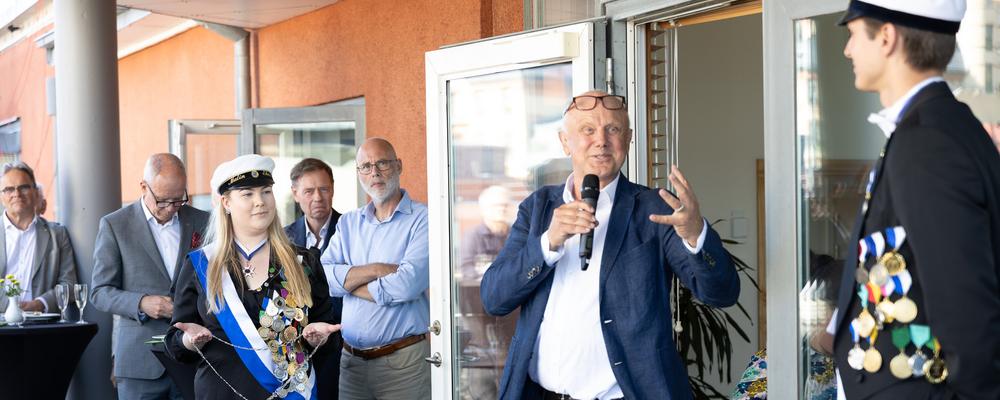
- Home
- News and events
- Find news
- 14 years as Dean – Per Cramér looks back
14 years as Dean – Per Cramér looks back
At the end of June 2024, Per Cramér will leave his position as Dean of the School of Business, Economics and Law, as his term of office comes to an end. Defining his life for the past 14 years, this position has involved intellectual stimulation and exciting encounters, but above all the development of the School.
How would you sum up your 14 years as Dean?
14 years is a very long time. It is only now, as I hand the job over, that I have been compelled to think about what I have done. Looking back, it is a real privilege to have been the Dean of the School of Business, Economics and Law for so long. It has been hugely stimulating and really enjoyable. I have had the privilege of surrounding myself with good creative and inspiring colleagues and together we have been able to define a strategic direction and then follow it.
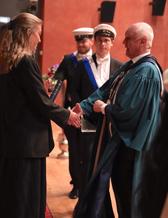
We have employed a number of basic ideas, focusing on quality and relevance in education and research. To achieve a better balance and to ensure a close link between education and research, we have consciously worked to expand research while keeping education constant.
We have also worked on developing relations with the wider community. We have strengthened, deepened and broadened these relations – a necessary move to maintain relevance in a time of rapid societal change. We need to understand how society’s demand for knowledge and skills is changing. This is particularly relevant for us at the School, as we work in areas that could be described as applied social sciences. We have to put out well-calibrated antennas to understand the consequences of change and to be able to formulate research questions and design educational programmes that respond to society’s needs.
A third line of development has been the increased internationalisation of our activities, for example through new and more extensive cooperation outside of Europe. We are also seeing greater recruitment of students with a foreign degree to our English programmes, which we now offer at both Bachelor’s and Master’s level. This allows us to create a multicultural classroom in Gothenburg that enhances the quality of our education by bringing in new perspectives.
There is also the issue of social responsibility. We educate young people to take up positions of influence, so we have to teach them that this carries responsibilities for themselves, for their organisations and for society at large. We are talking about tomorrow’s entrepreneurs, judges, business leaders, and so on. It is in this light that our consistent integration of sustainability perspectives into our educational programmes should be viewed.
I am incredibly proud that we have been able to establish these lines of development. We have maintained a high degree of continuity in our strategies and set our sights higher each time.
Accreditations drive quality and reputation

Work on international accreditation has been fully developed during your time as Dean. Why has this been an important step in the development of the School of Business, Economics and Law?
International accreditation is a great way for business schools to establish ongoing international comparisons of quality in research and education. Working on this type of quality development takes considerable resources and would not have been justified if it was just about getting a new logo on our business cards. Analysing our activities and working towards meeting accreditation standards makes the accreditation processes themselves drivers of quality.
The standards of the three accreditation systems are different, but they are all collaboratively designed to promote quality improvements at business schools. They thus enjoy broad peer acceptance, unlike rankings where a commercial ranking agency sets the standards.
In 2022 the School demonstrated its inherent strength , within the space of 12 months, we were assessed by all three organisations – EQUIS, AACSB and AMBA – and received a perfect outcome, with 5-year reaccreditation from all three. As well as confirming our general quality among our international peers, we also received good advice for our future development. I am pleased to say that we are one of little more than 100 business schools in the world that can boast Triple Crown accreditation. This is important when entering into cooperation agreements with strong universities internationally. It boosts our reputation and makes things easier, especially outside Europe.
You have been involved in international accreditation networks and have a long track record. You have served seven years on the EQUIS Accreditation Board, three years on the AACSB Continuous Improvement Review Committee, three years on the AACSB European Advisory Board and now you are on the AACSB Initial Accreditation Committee. Plus you have participated in some 20 assessments for EQUIS and eight for AACSB, mostly as chair of the Peer Review Team. Why has this been important and what has it meant for the School?
Conducting an assessment is about sizing up the school, mainly on the basis of a site visit with peer-to-peer discussions. Of course, your job is to assess whether the school meets the standards, but you also learn a lot about how other business schools work and you take things home with you. It has been a great learning experience!
And on a personal level, it has been intellectually stimulating. Partly because you have to get your act together as chairman, but also because I have met many interesting colleagues and had many good conversations. Plus I have made acquaintances that will stay with me.
Broad and strong external engagement for the School of Business, Economics and Law
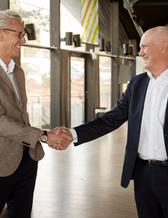
Contacts with the business world and the wider community are important for the School, and as Dean you have played a central role in establishing these. How has this developed over the years? Do our needs, and those of businesses and the community, look the same now as when you took office?
Maintaining relations with the community around us is a very important part of the Dean’s mandate. Things have changed a great deal. We are seeing broader interaction. We have long had excellent relations with our local, globally active, businesses, such as Volvo, SKF, Stena, the Port of Gothenburg and Mannheimer Swartling. There has been a broadening, but also a deepening, of our collaborations through framework agreements that also cover research cooperation. In recent years, we have entered into such agreements with Volvo Cars, Getinge and RISE, for example. In addition, we have seen an expansion of engagement with the public sector via the School’s Partner Programme.
There is a give and take with all our external partners. They employ our students and participate in applied research projects, as well as inspiring research questions and participating in research and education reference groups. We are now integrating our partners more deeply into our activities, for example through participation in reference groups for our educational programmes.
For my part, it has been a pleasure maintaining contact with our partners’ management teams. I have had so many stimulating conversations. There is a broad and strong commitment to the School of Business, Economics and Law within the surrounding community, and I think this has only become stronger, as was evident during our centenary celebrations last year, for example.
Balance between research and education
You have also worked hard with management teams, the Board and Heads of Department to improve the balance between research and education at the School of Business, Economics and Law. Why has this been important and how has it gone?
When I took office, large parts of the School’s activity were strongly focused on education. If we are to build up the quality of our education over the long term, I believe that we need it to be closely tied to our research. Education is about passing on knowledge to new generations. And that can’t be yesterday’s knowledge.
However, we haven’t been able to expand research activities through increases in the basic central funding, and have instead had to increase the inflow of external grants that we apply for in competition. We have been quite successful at that. Currently, around 60 per cent of our research is funded by external grants, and this has been supplemented by a number of major donations.
Today, we are in a situation where we have such a good balance that we can say with confidence that our education is closely linked to the research. This is a success story, but it also brings risks. We are becoming more grant-dependent, which requires us to continue to compete successfully for external research funding. We are managing to do this at an aggregated level, but at the department and section level, it fluctuates from year to year, creating challenges that need to be addressed. We have managed to successfully keep this going so far, so maybe we have found the right level.
Västlänken opened a window of opportunity
The construction of a new building for the School of Business, Economics and Law is a project that started during your time as Dean. It has been a long process and now you will not be hosting the new building’s inauguration. Are you disappointed?

Not at all. I hope I get to attend the opening!
It was about 13 years ago that we had our first meeting with the City of Gothenburg, the Swedish Transport Administration and Akademiska Hus about the possibility of placing an entrance to Västlänken station Haga actually in the School. We had already discussed the possibility of demolishing the dysfunctional brick buildings and expanding to bring the entire School together at one address. But we didn’t get anywhere, – there was resistance within City Hall. Västlänken then opened up a window of opportunity.
The pandemic was a dark period, but on the upside we were able to get the most disruptive operations – demolition and sheet piling – done during that time. Of course, having to work on a construction site for a long time has been stressful. We are having to deal with overcrowding and a lack of student workspaces, but I am impressed that the School has been able to tackle these challenges, for example through timetabling and optimising student workspaces.
At the point when the old blocks were demolished, we thought we would be moving into a new building in 2024, but now it will be 2027. With the blasting work completed at the beginning of the year, it is now a more normal, predictable construction project and every effort is being made to complete it by June 2027. This is also something I am quite proud of – that we have gone from the initial idea to a nearly finished building.
Important to have a bold Student Union that makes demands
A long line of active Student Union members have come through over the years. What does the Student Union mean for the development of the School of Business, Economics and Law?
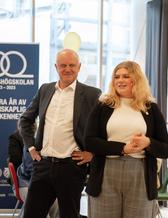
The Student Union of the School (HHGS) is a unique asset to the School. With its ability to bring students together (over 70 per cent of our students are HHGS members), the Student Union is a legitimate voice.
The important thing for Faculty Management is that we have a strong and independent student body, preferably one that is quite bold and wants to work together to improve the School. HHGS has certainly lived up to that. HHGS has the ability to engage students through a variety of activities, but also to represent the Union and the School externally through, for example, choirs, fairs, associations and the unique union enterprises. This shows that our students have a tremendous capacity for action and engagement. The Student Union gives students at the School an opportunity to gain experiences that go far beyond what is taught in the lecture theatres. HHGS is an incomparable organisation that contributes to a strong sense of cohesion. It also drives Faculty Management to do better.
HHGS’s commitment to the centenary homecoming was outstanding, but so was the way it stepped up during the pandemic. We opened up the premises so that students could come here and study, and the Student Union really shouldered its responsibility to ensure that the strict pandemic rules were respected, and also to maintain social networks and meeting places. This was all good for student health.
Exciting encounters and intellectual stimulation
What has been the best thing about being Dean of the School of Business, Economics and Law?
That it has been so intellectually stimulating. Being surrounded by such fantastic colleagues and management teams that have had a low level of pretentiousness has allowed us to work openly, with high ceilings for argumentation, which in turn has enabled us to deal with really difficult issues through frank discussions that pitted sound arguments against each other.
Your best memory from these 14 years?
It is difficult to pick out anything specific. So many things have been great fun. It was an amazing feeling when we survived the avalanche of reaccreditation processes in 2022 with the best possible outcome. It confirmed that we were operating at a high standard.
I have also had many exciting encounters with people. Timothy Snyder’s Tore Browaldh lecture and the discussion that followed were a prime example of good intellectual stimulation. But I am also pleased about details like the solar panels on the roof. Or when we have had complex discussions on difficult issues within the Faculty Board or the Academic Appointments Board, and then made a decision that has collegial legitimacy and that everyone feels they can really get behind. That was always very satisfying.
What are you most going to miss?
I think I will miss the intensity of the work to some extent. And I will miss all the people I worked so closely with for so many years, such as the management team and the staff at the Faculty Office. We have had a great deal of integrity and mutual respect, but we have also been able to look at ourselves and laugh. It has been a great privilege to work in this environment.
What will you definitely not miss?
The frustration of feeling inadequate – in everything from not quite achieving the goal I was striving for to struggling to catch up with my emails. These are feelings that I will not miss. And it will be a relief to be fully in control of my own schedule.
Will be researching the meaning of the term war in Swedish law
What will you do now?
I will return to the Department of Law and work on a research project that has been ongoing for a number of years, dealing with the legal conditions for preparedness with a focus on the meaning of the term war in Swedish law. These are issues that have become all too topical in our time and that need to be further explored.
I am very pleased with the new management team that will be taking over and I am in no doubt that they will continue to be instrumental in the development of the School of Business, Economics and Law.
The most important thing right now is to address the fact that the role of academia in society is at risk at a time when society needs a strong independent academy. The demarcation line between opinions and statements of fact has become increasingly blurred in public debate and academia has a responsibility to maintain it. Academia must therefore be free from political influence and the School of Business, Economics and Law must be an arena where we can have fact-based, respectful discussions on complex issues that polarize society. To realize this poses a major challenge for the future that we have a common responsibility to meet.
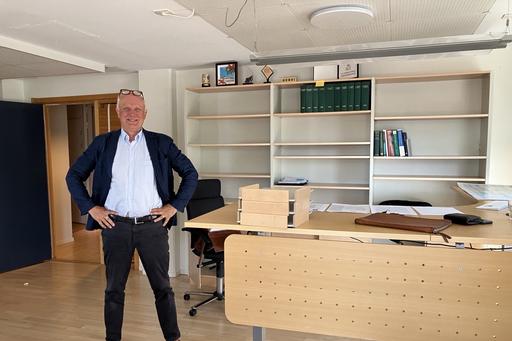
TEXT: Maria Norrström